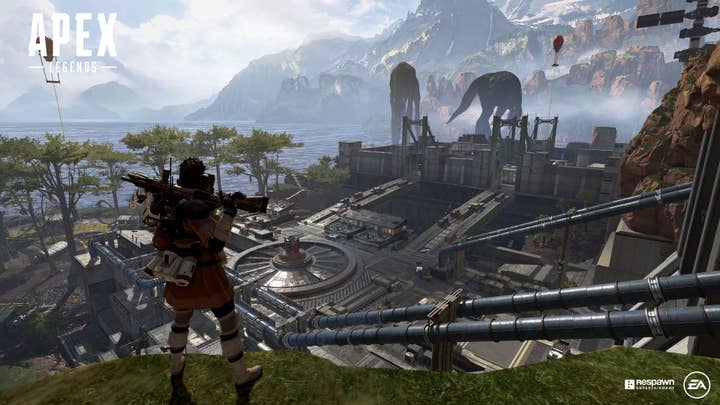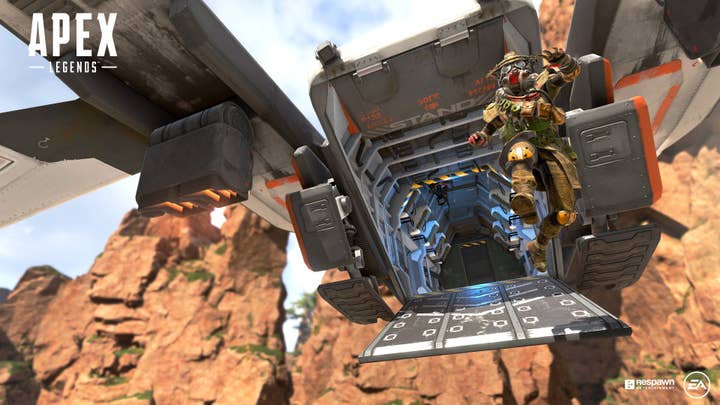EA didn't pre-announce Apex Legends because it was scared to | Opinion
And it may well have been a really smart decision
"We're doing a free to play game, with essentially loot boxes, after we were bought by EA, and it's not Titanfall 3. It's the perfect recipe for a marketing plan to go awry, so why have that - let's just ship the game and let players play."
When the news of Apex Legends leaked out over the weekend, I was genuinely quite excited. Not so much by the game itself (although I'm sure it's great) but the method in which it was being announced.
It was leaning on influencers first and foremost, no pre-launch hype, no PR campaign. This is EA's first major new IP since 2014's Titanfall (discounting those great EA Originals titles), sneaking out just before that other major new IP Anthem, and the publisher was just going to drop it on us out of nowhere. It's a sign of supreme confidence in the product and a bold marketing strategy. Could it work? It would be brilliant if it did.
And then the game's line producer, Drew McCoy, gave that above quote to Eurogamer. And the excitement I felt vanished in a moment. This wasn't some bold new, experimental marketing initiative, but an inevitable reaction to a no-win PR situation.
EA is acutely aware of the toxicity its name can evoke in certain circles. After all, we're talking about a company that has won and still ranks highly in the 'worst companies in America' list (who knew making video games could be so evil?). It knows how games communities and the media feel about loot boxes and free-to-play (they hate them). It knows how games communities and the media feel about Titanfall (they love it). The conspiracy theories write themselves. EA, after sending Titanfall 2 out to die during a hyper competitive month, bought up the business and forced it to stop making Titanfall games and build a free-to-play title instead.
"The conspiracy theories write themselves. EA, after sending Titanfall 2 out to die, bought up the business and forced it to stop making Titanfall 3 and build a free-to-play game instead"
It certainly fits the profile. EA is a notorious trend follower. Apex Legends ticks all those Fortnite boxes. You can already imagine the E3 reaction to its reveal. The snarky Twitter comments. The endless interview questions about the game's business model. Indeed, GamesIndustry.biz has long heard how a number of Respawn developers have returned to their former stomping ground at Infinity Ward, so you can just imagine what people would make of that. All it takes is for one disgruntled employee to sound off on Reddit about how 'this wasn't the game I joined the company to make', and suddenly you've got a headline.
Even if it's not true, it sounds it, and that's the important thing. It doesn't matter that Respawn boss Vince Zampella has never made a bad game. It doesn't matter if a new battle royale title by one of the most acclaimed shooter developers in the world is actually an exciting thing. There is too much potential for negativity and anger, that the reception is almost inevitable. So why risk it? Just get the game out there and avoid the months of PR hell that'll only succeed in distracting and depressing the development team.
EA has been stung once already in the last nine months, when it announced Command & Conquer: Rivals for smartphones at E3. The return of one of its most loved strategy games on the world's biggest games platforms, and it was derided, mocked and heckled. You might expect it from the gaming community, who really wanted a full new PC game, but this also came from those within the business itself. The game has a 4.5/5 score on the App Store, players actually like it, but that didn't matter. It was EA. It was free-to-play. It was mobile. It was wrong.
So of course, of course, Apex Legends didn't get a pre-release campaign.

There is something to be said, and we've said it in the past, of the challenging nature of working with a super passionate (don't say the word 'entitled') gaming audience. They want certain things, and if you don't deliver, you can expect review bombing, petitions and a lot of moaning.
But how much does the media feed into this? Two weeks ago I was talking to a former leading editor from a well-known movie publication and he said: "Film journalism is much like games. The only difference is that we like our medium." It's not the first I've heard it. It's a frequent joke in the business about how the games media seem to hate video games. It's not actually true. It's not that the games media hates games, it's just that the negative stories tend to generate the most noise. It's right that the games media addresses concerns around loot boxes, or exposes bad working practices. It's not that these stories outweigh the others, it's just that they generate the most discussion.
"We as an industry talk about the importance of accessibility, diversity and inclusivity. Except, apparently, when that comes to showing a mobile game at Blizzcon"
In October last year, I was a little frustrated by the lack of wider coverage of our Best Places To Work Awards. Rockstar was dominating the headlines with reports of its crunch culture. However, a three-month research project, with thousands of employees surveyed, which revealed the games companies that do things right (notably, EA's Criterion emerged as No.1 in the UK), barely got a look in. We detailed more than 20 UK and Canadian games companies that are excellent employers with a happy workforce. But the wider industry was more interested in unhappy places. And yet, I understood why. Our own Rockstar coverage was by far our most read stories of the month, well ahead of our exclusive research project. There's no news like bad news.
Yet, even so, could it be true that perhaps we (and I say we, because the business press can be guilty of it, too) are just a little too sceptical? A lot of the media today like to add opinion and personality even to straight news stories and let's be honest, most of the time those opinions are questioning and challenging (as journalists should be). The problem is that developers and publishers are now openly frightened to tell you about what they're working on. Ubisoft's Davide Soliani, ahead of revealing Mario + Rabbids at E3, had told his team to "prepare for the worst". PlayStation and Xbox no longer show anything outside of core games on stage at E3, because gamers don't want to see kids games or things like Move or Kinect.
We as an industry talk about the importance of accessibility, diversity and inclusivity. Except, apparently, when that comes to showing a mobile game at Blizzcon. It's not the right audience, of course. And now it never will be.
How do you deal with this negativity and scepticism towards anything that doesn't adhere to consumer expectation? Well, perhaps Respawn has found the answer: don't give anyone the chance to be angry, or to set-up petitions, or send furious tweets. Just put it out there, and get a million people to pick up a pad and play it. If they like it? Happy days. If not? Well, Anthem is out in a few weeks, and maybe they'll make Titanfall 3 next.
In other words: "Let's just ship the game and let players play."

